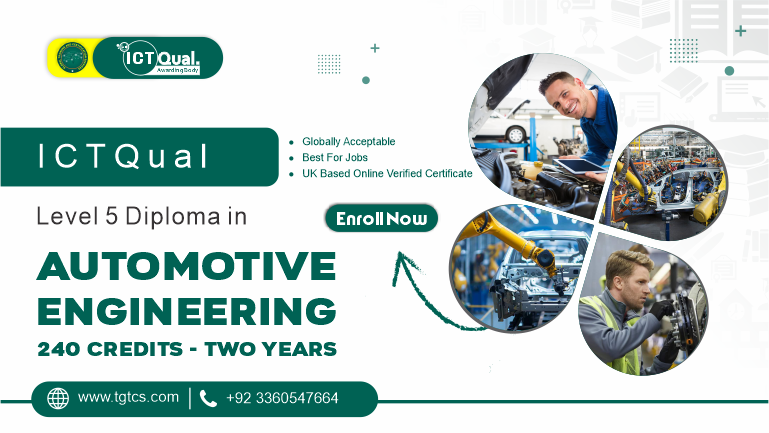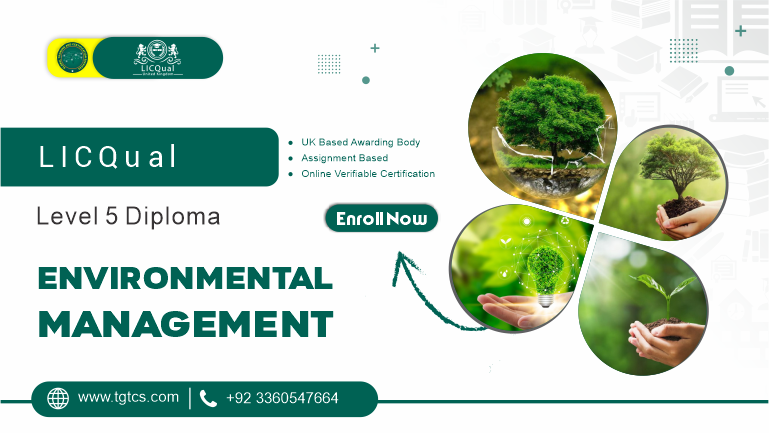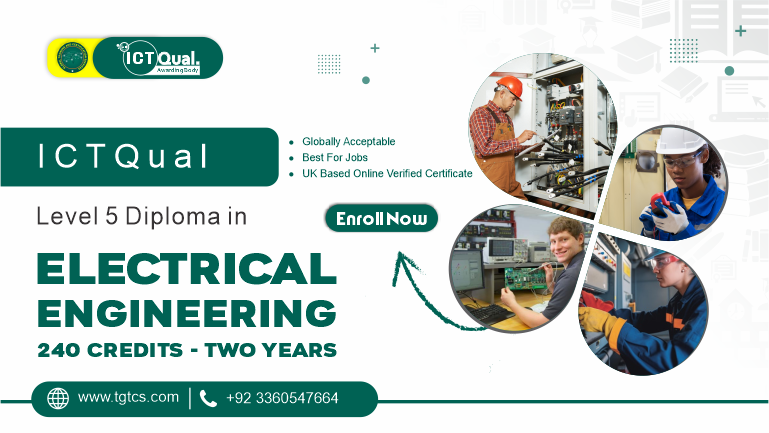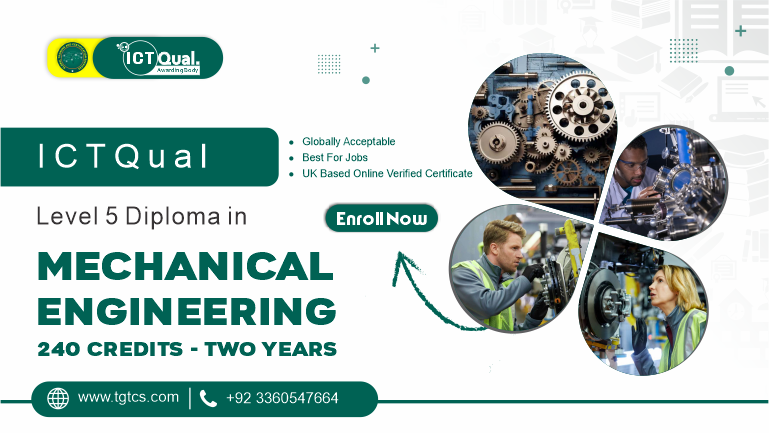ICTQual Level 5 Diploma in Automotive Engineering 240 Credits – Two Years
The ICTQual Level 5 Diploma in Automotive Engineering (240 credits) is a comprehensive two-year program designed for individuals who want to develop advanced technical skills and knowledge in the automotive industry.
This qualification is ideal for those already working in automotive engineering or related fields who want to enhance their expertise and open doors to senior roles. In this blog post, we will explore everything you need to know about this prestigious diploma, including course details, key benefits, and career opportunities.
The ICTQual Level 5 Diploma in Automotive Engineering is a nationally recognized qualification designed to provide learners with advanced technical knowledge and practical skills in automotive engineering. The course covers a wide range of topics, including vehicle systems, diagnostics, automotive technology, and engineering management.
If you’re looking to take your automotive engineering career to the next level, the ICTQual Level 5 Diploma in Automotive Engineering (240 credits) is the perfect qualification for you. With its comprehensive curriculum, practical skills development, and career-boosting potential, this course will help you become an expert in the ever-evolving automotive industry.
The Global Training and Certification Services (TGTCS) is Directly Approved Training Centre of ICTQual
The ICTQual Level 5 Diploma in Automotive Engineering is a comprehensive two-year program offering 240 credits. It is designed for individuals seeking to advance their expertise in automotive engineering.
The course covers a wide range of topics, including vehicle systems, diagnostics, hybrid and electric vehicle technologies, and automotive engineering management. It is ideal for professionals in the automotive industry who want to deepen their technical knowledge and move into senior roles. The qualification provides hands-on experience and equips students with the skills necessary to succeed in leadership positions, while opening up career opportunities in fields such as automotive engineering management, vehicle systems engineering, and hybrid vehicle specialization.
Mandatory Units
The Units of Level 5 Diploma in Automotive Engineering 240 Credits-Two Years are as :
Year 1 – Foundation and Core Skills (120 Credits)
- Introduction to Automotive Engineering
- Fundamentals of Vehicle Mechanics
- Electrical and Electronic Systems in Vehicles
- Engineering Mathematics for Automotive Applications
- Materials and Manufacturing Processes
- Vehicle Dynamics and Control
- Thermodynamics and Heat Transfer in Automobiles
- Hydraulics and Pneumatics in Automotive Systems
- Health and Safety in Automotive Engineering
- Professional Skills and Communication
- Introduction to Vehicle Diagnostics
- Sustainable Practices in Automotive Engineering
Year 2 – Advanced Concepts and Specialization (120 Credits)
- Advanced Vehicle Diagnostics and Troubleshooting
- Hybrid and Electric Vehicle Technology
- Autonomous Vehicle Systems
- Advanced Manufacturing Technologies
- Powertrain Design and Analysis
- Aerodynamics in Automotive Design
- Embedded Systems in Vehicles
- Automotive Project Management
- Quality Control and Testing
- Environmental Regulations and Standards
- Final Project – Automotive Engineering Innovation
- Industrial Placement (Internship)
Below are the learning outcomes for each study unit in the ICTQual Level 5 Diploma in Automotive Engineering program:
Year 1 – Foundation and Core Skills (120 Credits)
Introduction to Automotive Engineering
- Understand the history, structure, and development of the automotive industry.
- Identify career opportunities and the role of engineering in automotive innovation.
- Apply basic engineering principles to vehicle systems.
Fundamentals of Vehicle Mechanics
- Explain the operation of engines, transmissions, and drivetrain systems.
- Analyze mechanical failures and propose effective repair or maintenance solutions.
- Apply mechanical engineering principles to optimize vehicle performance.
Electrical and Electronic Systems in Vehicles
- Understand basic electrical circuits, components, and systems used in vehicles.
- Diagnose common electrical issues using appropriate diagnostic tools.
- Implement safety procedures while working with electrical systems.
Engineering Mathematics for Automotive Applications
- Apply mathematical techniques to solve automotive engineering problems.
- Utilize algebra, calculus, and statistics to analyze automotive systems.
- Demonstrate proficiency in computational tools for engineering calculations.
Materials and Manufacturing Processes
- Understand the properties and applications of materials used in automotive engineering.
- Analyze modern manufacturing processes and their impact on vehicle design.
- Evaluate material selection for durability, sustainability, and performance.
Vehicle Dynamics and Control
- Explain principles of motion, stability, and handling in vehicles.
- Analyze the effects of forces on vehicle performance.
- Apply control systems to enhance safety and efficiency.
Thermodynamics and Heat Transfer in Automobiles
- Understand thermodynamic principles related to automotive engines.
- Evaluate heat transfer mechanisms in vehicle systems.
- Propose solutions for improving energy efficiency in vehicles.
Hydraulics and Pneumatics in Automotive Systems
- Understand the principles of fluid power systems in vehicles.
- Diagnose and repair hydraulic and pneumatic components.
- Apply fluid mechanics knowledge to automotive applications.
Health and Safety in Automotive Engineering
- Identify workplace hazards and implement effective safety protocols.
- Understand legal and ethical responsibilities in automotive engineering environments.
- Conduct risk assessments to ensure safe practices in automotive engineering.
Professional Skills and Communication
- Develop effective technical writing and reporting skills.
- Demonstrate teamwork and interpersonal skills in engineering projects.
- Communicate complex ideas clearly to both technical and non-technical audiences.
Introduction to Vehicle Diagnostics
- Use diagnostic tools to identify faults in vehicle systems.
- Interpret diagnostic data to recommend maintenance or repairs.
- Understand the role of software in modern vehicle diagnostics.
Sustainable Practices in Automotive Engineering
- Evaluate the environmental impact of automotive technologies.
- Propose solutions for reducing emissions and waste in vehicle design.
- Understand the importance of sustainability in the automotive sector.
Year 2 – Advanced Concepts and Specialization (120 Credits)
Advanced Vehicle Diagnostics and Troubleshooting
- Master advanced diagnostic tools and techniques for modern vehicles.
- Troubleshoot complex faults in mechanical and electronic systems.
- Apply problem-solving skills to optimize vehicle performance.
Hybrid and Electric Vehicle Technology
- Understand the principles of electric propulsion and hybrid systems.
- Analyze the design and functionality of energy storage systems.
- Evaluate the environmental and economic benefits of electric vehicles.
Autonomous Vehicle Systems
- Explore the technologies enabling autonomous vehicles, such as sensors and AI.
- Understand the ethical and regulatory considerations of autonomous systems.
- Analyze the challenges and opportunities in autonomous vehicle development.
Advanced Manufacturing Technologies
- Understand CNC machining, additive manufacturing, and robotics in automotive production.
- Evaluate the impact of advanced manufacturing on efficiency and sustainability.
- Apply modern manufacturing techniques to automotive engineering projects.
Powertrain Design and Analysis
- Design and analyze powertrain systems, including alternative fuels.
- Optimize powertrain performance for energy efficiency and emissions reduction.
- Understand the integration of hybrid and electric powertrains in modern vehicles.
Aerodynamics in Automotive Design
- Analyze the impact of aerodynamic forces on vehicle performance.
- Design solutions to minimize drag and improve fuel efficiency.
- Evaluate the role of aerodynamics in both high-performance and eco-friendly vehicles.
Embedded Systems in Vehicles
- Understand the role of microcontrollers, sensors, and software in modern vehicles.
- Design and test embedded systems to enhance vehicle functionality.
- Troubleshoot issues in vehicle electronics and embedded systems.
Automotive Project Management
- Plan and manage engineering projects using industry-standard tools and methodologies.
- Evaluate project risks and develop effective mitigation strategies.
- Lead multidisciplinary teams to successfully achieve project objectives.
Quality Control and Testing
- Understand principles of quality assurance in automotive engineering.
- Design and conduct tests to ensure vehicle safety, reliability, and compliance.
- Analyze test results to recommend improvements in vehicle design.
Environmental Regulations and Standards
- Understand global regulations concerning emissions and automotive safety.
- Ensure compliance with environmental and safety standards in vehicle design.
- Propose strategies to meet regulatory requirements while maintaining vehicle performance.
Final Project – Automotive Engineering Innovation
- Develop innovative solutions to real-world automotive engineering challenges.
- Integrate knowledge from various disciplines to solve complex problems.
- Present project findings clearly to both technical and non-technical audiences.
Industrial Placement (Internship)
- Gain practical, hands-on experience in a professional automotive environment.
- Apply theoretical knowledge to real-world engineering challenges.
- Build industry connections and develop professional skills for future career opportunities.
This structured curriculum ensures students gain the practical and theoretical expertise required to excel in the automotive engineering industry, positioning them for success in a range of specialized roles.
The ICTQual Level 5 Diploma in Automotive Engineering (240 Credits – Two Years) offers a range of significant benefits for individuals pursuing a career in automotive engineering. Here are the key advantages of undertaking this course:
1. Comprehensive Knowledge and Skill Development
- The course provides a deep understanding of advanced automotive technologies, engineering principles, and design processes.
- Students will acquire practical skills in diagnostics, repairs, and the integration of electrical and mechanical systems within vehicles.
2. Industry-Relevant Curriculum
- With a curriculum tailored to meet the needs of the modern automotive industry, this diploma ensures students are up-to-date with the latest trends, innovations, and best practices in automotive engineering.
- The course includes modules that cover engine design, automotive electronics, hybrid technologies, and sustainable vehicle design, all of which are highly relevant in today’s industry.
3. Strong Career Prospects
- Graduates of this diploma will be well-equipped for a wide range of roles in the automotive sector, including automotive design engineer, vehicle systems engineer, or service and maintenance specialist.
- The qualification is recognized by employers worldwide, ensuring that graduates are in high demand and have greater opportunities for career advancement.
4. Practical, Hands-On Experience
- The course focuses not only on theoretical knowledge but also on practical application, providing students with opportunities to work on real-world projects and develop hands-on expertise.
- Students will gain practical experience in automotive workshops and labs, reinforcing their learning through direct interaction with vehicles and automotive technologies.
5. Flexible Learning Structure
- This course is designed to be completed over two years, allowing students to balance their studies with work or personal commitments.
- The flexible nature of the program also provides opportunities for those already employed in the automotive industry to upskill and advance their qualifications.
6. Enhanced Problem-Solving and Analytical Skills
- The course challenges students to think critically, analyze complex engineering problems, and develop innovative solutions—skills that are highly valued in engineering and technology sectors.
7. Progression Pathways
- Upon completion, students can further advance their studies by progressing to higher qualifications, such as a Level 6 qualification or a bachelor’s degree in automotive or mechanical engineering.
- The diploma also provides a solid foundation for individuals looking to specialize in areas such as electric vehicles (EVs) or autonomous vehicle technology.
8. Global Recognition
- ICTQual Level 5 is an internationally recognized qualification that is accepted by employers and educational institutions globally, allowing students to pursue career opportunities or further studies in various countries.
9. Personal and Professional Growth
- Through this diploma, students will not only enhance their technical skills but also develop their communication, teamwork, and leadership abilities, which are essential in the automotive engineering field.
- The course fosters confidence and prepares graduates to take on managerial roles in the future.
10. Sustainable and Cutting-Edge Technologies
- As the automotive industry shifts toward more sustainable technologies, students will gain exposure to electric, hybrid, and environmentally friendly automotive systems.
- Graduates will be equipped to contribute to the transition toward greener technologies, which is increasingly important in the evolving automotive industry.
By completing the ICTQual Level 5 Diploma in Automotive Engineering, students will be well-prepared for a successful career in an exciting and fast-evolving field, with skills and qualifications that open doors to numerous opportunities in the automotive industry.
The ICTQual Level 5 Diploma in Automotive Engineering (240 Credits – Two Years) is ideal for individuals who are passionate about pursuing a career in automotive engineering and have a keen interest in the design, development, and maintenance of vehicles. The ideal learner for this course possesses the following characteristics:
1. Aspiring Automotive Engineers
- The ideal learner has a strong desire to work in the automotive industry, whether in vehicle design, manufacturing, diagnostics, or repairs. They are motivated by the idea of solving complex engineering problems and contributing to the development of cutting-edge automotive technologies.
2. Technical and Analytical Thinkers
- Learners should enjoy working with technical systems and be adept at problem-solving. The course requires individuals who are comfortable with analytical tasks such as understanding complex mechanical and electrical systems, troubleshooting issues, and designing solutions for automotive technologies.
3. Hands-On Learners
- The course combines theoretical learning with practical, hands-on experience. Ideal learners are those who thrive in environments where they can apply their knowledge to real-world situations, such as working with automotive systems, performing diagnostics, and participating in practical workshops or labs.
4. Individuals Seeking Career Progression
- This diploma is well-suited for individuals who are already working in the automotive industry and wish to enhance their knowledge and qualifications. It is ideal for professionals looking to advance to senior roles in automotive engineering or transition into new areas such as electric vehicles (EVs) or hybrid technologies.
5. Detail-Oriented and Precise
- Automotive engineering requires great attention to detail, especially when working on intricate vehicle systems. Ideal learners are individuals who can carefully assess mechanical components, troubleshoot issues accurately, and ensure high standards in their work.
6. Adaptable and Open to Technological Advancements
- As the automotive industry rapidly evolves, learners should be willing to adapt to new technologies, such as electric propulsion, autonomous vehicles, and hybrid systems. The ideal learner is open to learning about emerging trends and has a forward-thinking mindset to embrace innovation.
7. Committed and Self-Disciplined
- The two-year duration and comprehensive nature of the course require commitment and discipline. Ideal learners are individuals who can manage their time effectively, meet deadlines, and stay focused on their studies while balancing other responsibilities, such as work or personal life.
8. Collaborative and Team-Oriented
- Automotive engineering often involves working in teams to design, develop, and test automotive systems. The ideal learner enjoys collaborating with others, sharing ideas, and contributing to group projects that require collective problem-solving.
9. Professionals with a STEM Background
- Although not mandatory, the course is especially suited for learners with a background in science, technology, engineering, or mathematics (STEM). Individuals with experience in related subjects, such as mechanical engineering, electrical engineering, or physics, will find it easier to grasp the core concepts of automotive engineering.
10. Future-Focused and Environmentally Conscious
- With the increasing emphasis on sustainability and environmental impact in the automotive industry, ideal learners should have an interest in green technologies and be motivated by the opportunity to contribute to the development of energy-efficient, eco-friendly vehicles.
11. Goal-Oriented and Career-Focused
- The ideal learner is someone who has clear career goals in the automotive industry, whether they aspire to become a lead automotive engineer, a specialist in vehicle systems, or a consultant in advanced vehicle technologies. They are focused on advancing their careers through a recognized, prestigious qualification.
12. Entrepreneurial Mindset (Optional)
- Some learners may have an entrepreneurial spirit, aiming to start their own automotive business or consultancy. The course equips individuals with the technical and business knowledge required to potentially launch a career as an independent automotive engineer or technician.
In summary, the ideal learner for the ICTQual Level 5 Diploma in Automotive Engineering is someone who is passionate, technically skilled, and eager to advance their career in a fast-evolving industry. They are hands-on, adaptable, and committed to learning, with a strong interest in the future of automotive technologies and sustainability.
The ICTQual Level 5 Diploma in Automotive Engineering provides learners with a strong foundation and advanced knowledge, opening doors to further education and exciting career opportunities. Graduates can explore a variety of progression paths:
1. Academic Progression
Graduates can continue their studies by enrolling in higher-level qualifications to deepen their expertise and expand their career options:
- Level 6 Diplomas or Advanced Certifications: Pursue specialized qualifications in areas such as vehicle dynamics, electric vehicle technology, or autonomous systems to further enhance technical proficiency.
2. Career Progression
This diploma equips graduates for a range of technical and professional roles within the automotive industry, including:
- Automotive Engineer: Focused on designing, developing, and testing advanced vehicle systems.
- Vehicle Diagnostics Specialist: Specializing in fault analysis and advanced troubleshooting.
- Electric Vehicle Technician: Working with hybrid and electric vehicle maintenance and repair.
- Quality Assurance Engineer: Ensuring vehicle safety, performance, and compliance with industry standards.
- Project Manager: Leading automotive engineering projects and managing teams.
3. Specialization in Emerging Technologies
As the automotive industry continues to evolve, graduates can choose to specialize in areas such as:
- Electric and Hybrid Vehicle Systems: Meeting the growing demand for sustainable transportation solutions.
- Autonomous Vehicles: Gaining expertise in self-driving technologies, sensors, and artificial intelligence (AI).
- Advanced Manufacturing: Working with cutting-edge technologies like 3D printing and robotics to enhance vehicle production processes.
4. Entrepreneurial Opportunities
The knowledge and skills gained can also empower graduates to start their own businesses, such as:
- Automotive Service Centers: Offering diagnostic and maintenance services.
- Specialized Workshops: Focusing on repairs for electric and hybrid vehicles.
- Engineering Consultancy: Providing expert advice to automotive companies on innovative design, manufacturing, and systems.
5. Industry Certifications
Graduates may also enhance their qualifications by obtaining industry-recognized certifications, such as:
- Certified Automotive Engineer (CAE): From relevant engineering bodies.
- Certifications in Specific Systems: Such as Bosch Diagnostic Systems or Tesla Technician Training.
6. Global Opportunities
The skills and knowledge gained from this diploma are internationally recognized, opening opportunities to:
- Work in global automotive markets.
- Contribute to multinational companies in research, development, and production roles.
- Explore career paths in related industries like motorsports, aviation, and energy systems, which require similar engineering expertise.
The ICTQual Level 5 Diploma in Automotive Engineering is a flexible and versatile qualification that serves as a springboard for further education, advanced specialization, and a wide range of career opportunities. Graduates are well-prepared to make a significant impact in the rapidly evolving automotive sector, whether they choose to enter the workforce or pursue higher studies.
Course Overview
Course Level
Level 5
Course Units
24 Mandatory Units
Duration
Two year






